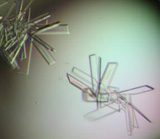|
|
|
|
Dr. Hong Ling
Professor
Postdoctoral Fellow National Institutes of Health
Ph.D. University of Alberta
B. Eng. China University of Geosciences
M334 Medical Sciences Building
Tel: (519) 661-3557
Fax: (519) 661-3175
Email: hling4@uwo.ca
Google Scholar: Hong Ling
|
|
|
Our research focuses on structure-function studies of key proteins in translesion DNA replication, a fundamental
process used by a cell to survive DNA damage. Regular replicative polymerases are blocked by damaged DNA, i.e.,
DNA lesions. In translesion DNA replication or translesion synthesis (TLS), cells employ specialized DNA
 polymerases to replicate through the damaged DNA. The specialized polymerases (mainly Y-family polymerases)
are intrinsically error-prone. Thus, TLS is a major source of mutations and is often associated with the onset of
diseases, such as cancer. Using X-ray crystallography in combination with various biochemical and molecular
biology approaches, we are working on (1) mechanistic studies of DNA translesion synthesis by exploring the
detailed interactions between Y-family DNA polymerases and their co-factors PCNA and substrates; (2) structural
studies of Y-family polymerases in the process with cancer associated DNA adducts to understand carcinogen
induced mutagenesis and translesion synthesis rendered anti-cancer drug resistance. Translesion DNA synthesis
is an essential process in life, involving DNA damage tolerance, mutagenesis, carcinogenesis and hypermutation
in B cells. The study will reveal the molecular basis of translesion DNA synthesis and provide information to
develop new drug to treat cancer. (read more)
polymerases to replicate through the damaged DNA. The specialized polymerases (mainly Y-family polymerases)
are intrinsically error-prone. Thus, TLS is a major source of mutations and is often associated with the onset of
diseases, such as cancer. Using X-ray crystallography in combination with various biochemical and molecular
biology approaches, we are working on (1) mechanistic studies of DNA translesion synthesis by exploring the
detailed interactions between Y-family DNA polymerases and their co-factors PCNA and substrates; (2) structural
studies of Y-family polymerases in the process with cancer associated DNA adducts to understand carcinogen
induced mutagenesis and translesion synthesis rendered anti-cancer drug resistance. Translesion DNA synthesis
is an essential process in life, involving DNA damage tolerance, mutagenesis, carcinogenesis and hypermutation
in B cells. The study will reveal the molecular basis of translesion DNA synthesis and provide information to
develop new drug to treat cancer. (read more)
|
- Kirouac KN, Basu AK, Ling H. (2013). Replication of a carcinogenic nitropyrene DNA lesion by human Y-family DNA polymerase. Nucleic Acids Res.,
Epub 2012 Dec 24. Abstract
- Kirouac KN, Ling H. (2011). Unique active site promotes error-free replication opposite an 8-oxo-guanine lesion by human DNA polymerase iota. PNAS, 108(8):3210-5. Abstract
- Wong JH, Brown JA, Suo Z, Blum P, Nohmi T, Ling H. (2010). Structural insight into dynamic bypass of
the major cisplatin-DNA adduct by Y-family polymerase Dpo4. EMBO J., 29(12), 2059-69.
Abstract
- Kirouac KN, Ling H. (2009). Structural basis of error-prone replication and stalling at a thymine base by human DNA polymerase iota. EMBO J., 28(11), 1644-54.
Abstract
- Xing G, Kirouac K, Shin YJ, Bell SD, Ling H. (2009). Structural insight into recruitment of translesion DNA polymerase Dpo4 to sliding clamp PCNA. Mol. Microbiol., 71(3),678-91. Epub 2008 Dec 1.
Abstract
- Wong, J. H., Fiala, K., Suo, Z. & Ling, H. (2008). Snapshots of a Y-family DNA polymerase in replication:
substrate-induced conformational transitions and implications for fidelity. J. Mol. Biol., 379 (2), 317-330
Abstract
- Bauer, J., Xing, G., Yagi, H., Sayer, J. M., Jerina, D. M. & Ling, H. (2007). A structural gap in
Dpo4 supports mutagenic bypass of a major benzo[a]pyrene dG adduct in DNA through template misalignment. PNAS,
104 (38), 14905-14910. Abstract
- Ling, H, Sayer, J. M., Plosky, B. S., Yagi, H., Boudsocq, F., Woodgate, R., Jerina, D. M. & Yang, W. (2004). Crystal
Structure of a Benzo[a]pyrene Diol Epoxide Adduct in a Ternary Complex with a DNA Polymerase. PNAS,
Vol. 101, 2265-2269. Abstract | PDF
- Ling, H., Boudsocq, F., Plosky, B. S., Woodgate, R., and Yang, W. (2003). Replication of a cis-syn thymine dimer at
atomic resolution. Nature, Vol. 424, 1083-1087. Abstract | PDF
- Ling, H., Boudsocq, F., Woodgate, R. & Yang, W. (2001). Crystal Structure of a Y-family DNA Polymerase in Action: a
mechanism for error-Prone and lesion bypass replication. Cell,
Vol. 107, 91-102. Abstract | PDF
(All Publication List)
|
Research Sponsors
|
|
|
|
|

